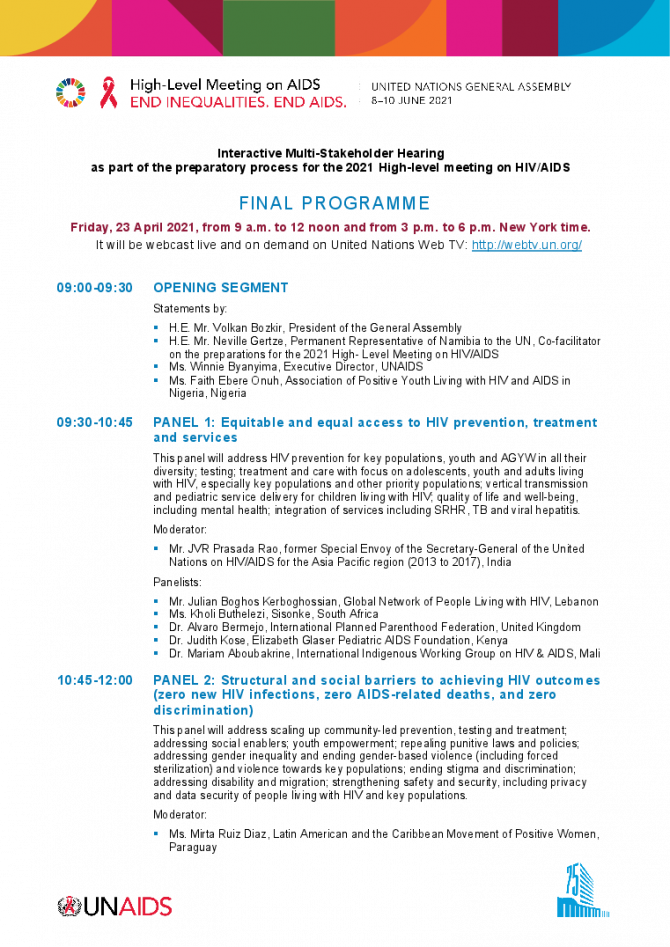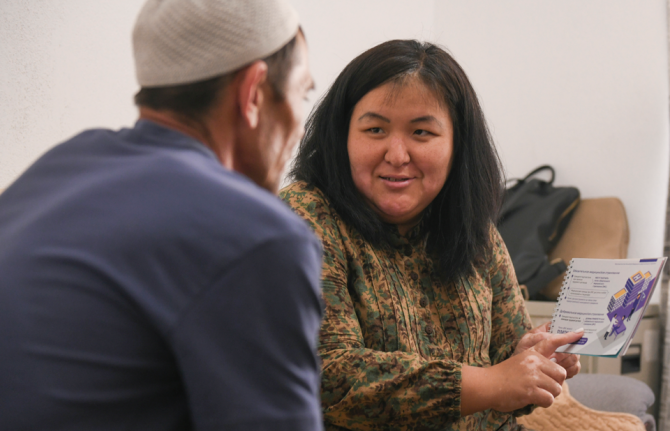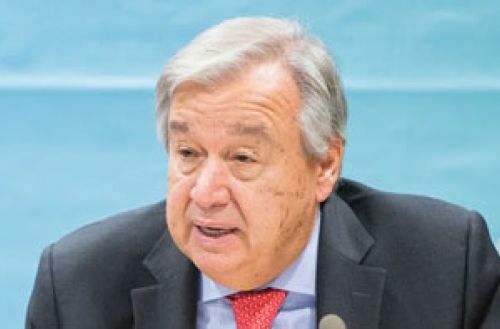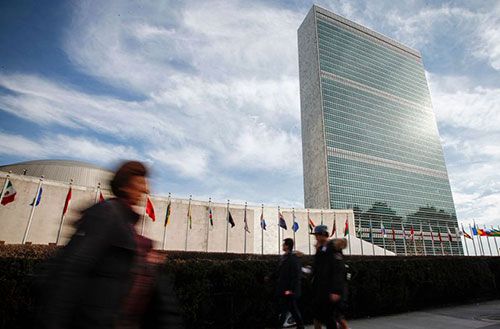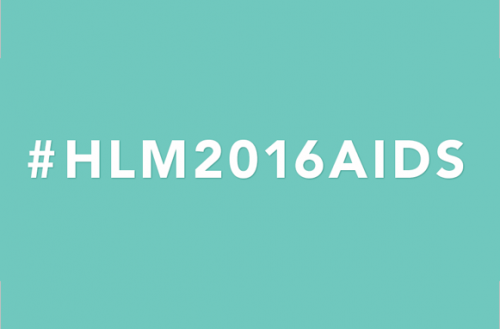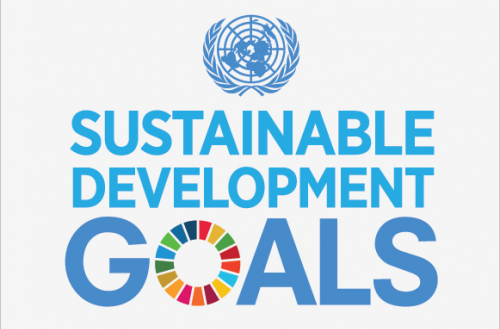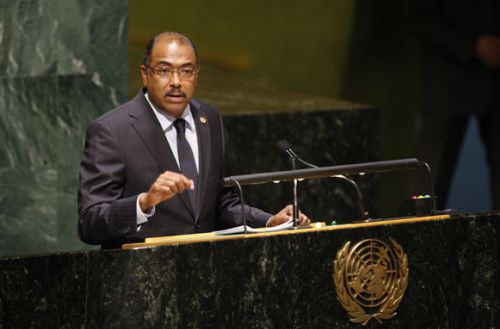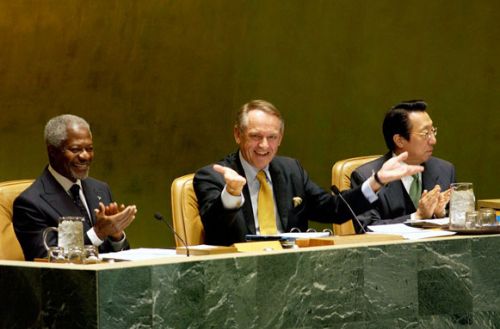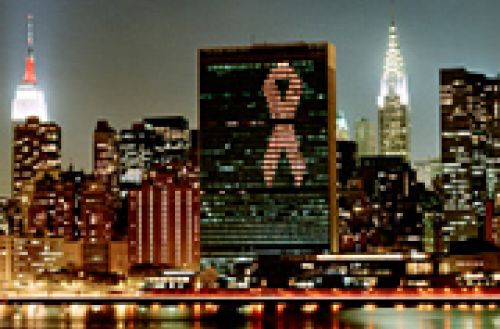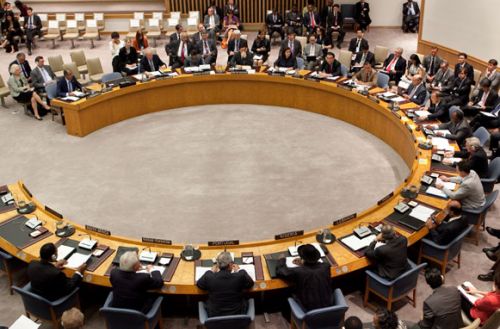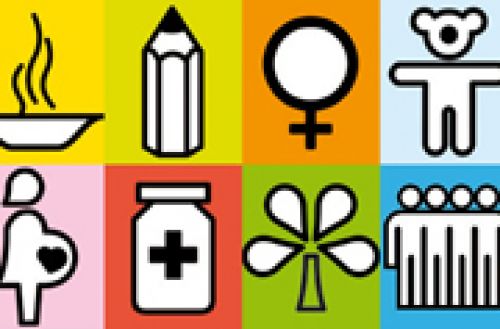Documents
Programme — Interactive Multi-Stakeholder Hearing — Friday, 23 April 2021
23 April 2021
Interactive Multi-Stakeholder Hearing as part of the preparatory process for the 2021 High-level meeting on HIV/AIDS - Friday, 23 April 2021, from 9 a.m. to 12 noon and from 3 p.m. to 6 p.m. New York time. It will be webcast live and on demand on United Nations Web TV: http://webtv.un.org/

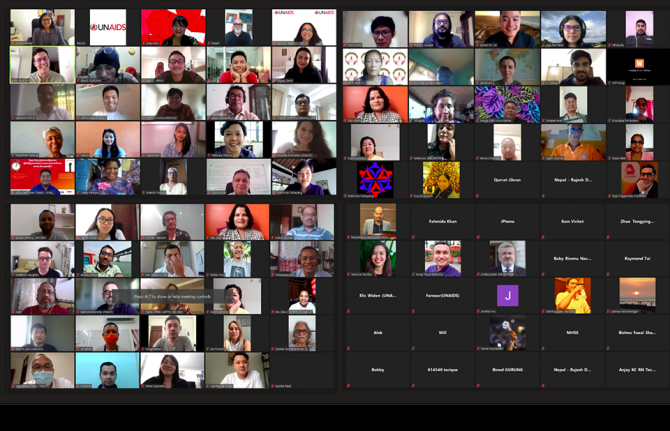
Feature Story
Civil society from Asia and the Pacific join the first regional consultation on the High-Level Meeting on AIDS
21 April 2021
21 April 2021 21 April 2021More than 150 civil society representatives from 17 countries in Asia and the Pacific joined the first virtual regional consultation on the upcoming United Nations High-Level Meeting on AIDS.
“Your views are important. We need them, and they really matter for the success of the political declaration,” said Mitch Fifield, Australia’s Ambassador and Permanent Representative to the United Nations and one of the two co-facilitators for the high-level meeting process, in his opening remarks. He also spoke about the valuable contributions of the participants to the high-level meeting and the critical role of communities in the HIV response.
The consultation was an opportunity for civil society organization leaders to take stock of the progress made and the challenges facing the HIV response in the region. It fostered cross-sharing of different expectations of the high-level meeting, allowing civil society organization representatives to share what they see as important for inclusion in the political declaration and to collect inputs to be shared with the multistakeholder task force in preparation for the multistakeholder hearing.
Asia and the Pacific has the second largest regional epidemic after Africa, with 300 000 new HIV infections in 2019. Key populations and their partners accounted for an estimated 98% of new HIV infections, and more than one quarter of new HIV infections were among young people (aged 15 to 24 years). At present, in Asia and the Pacific 160 000 people die from AIDS-related illnesses every year because they do not receive life-saving treatment in time, or the quality of care is insufficient. Nearly 2.3 million people living with HIV, or 40%, are not on treatment, signifying a need to increase treatment coverage.
The participants at the consultation stressed that the new political declaration should give prominence to the scale-up of HIV prevention and treatment efforts, including pre-exposure prophylaxis, self-testing, harm reduction services, same-day antiretroviral therapy, multimonth dispensing and comprehensive sexuality education. Strengthening health systems and the integration of HIV services with other health services, such as services for mental health, sexual and reproductive health, and tuberculosis, is seen as a priority for the next five years to ensure that no one is left behind. “To end AIDS, we must ensure universal, free and sustainable access to prevention and treatment services. The political declaration should be built on the last milestones, especially the Declaration on Universal Health Coverage,” said a civil society organization leader.
Community members recognized that policy and legal barriers, including the criminalization of sex work, consensual same-sex sexual relations and drug use, are deterring people living with HIV and key populations from accessing health services and undermining efforts to end AIDS. “Sex work and drug use are not crimes but a part of life for many. This should be strongly stated in the political declaration,” said one participant. Key population leaders made a strong statement about removing harmful laws, policies and practices towards key populations. They highlighted the need to strengthen the legal and policy environment to protect key populations and vulnerable groups from stigma, discrimination and violence.
Current investments in the HIV response in the region reflect inadequate HIV financing, particularly for key population programming. Civil society organization leaders agreed that to ensure the sustainability of HIV programmes, increased political commitment for domestic funding and financing for communities and key populations programmes are critical. “Investments in HIV must be anchored on the principles of equity, social justice and accountability. These should include investments to support people-centred approaches to health service delivery where services are differentiated but integrated,” said another community representative.
The participants also considered the impact of the COVID-19 pandemic on communities in the region. The diversion of resources and health workers to respond to the more immediate COVID-19 pandemic presents a real risk, threatening the hard-fought-for gains of the HIV response. “We should ensure that the focus on HIV remains strong while dealing with COVID-19, and regular HIV services and uninterrupted supply of antiretroviral therapy should be guaranteed,” said a community leader. Communities also stressed the importance of a new political declaration that considers how COVID-19 has impacted community-led responses to HIV. “There should be financial commitments, a crisis fund or financial safety networks for key populations because they suffered immensely during the COVID-19 pandemic,” one participant said.
Throughout the consultation, the first and foremost demand has been for inclusiveness of key populations in decision-making. “If key populations and people living with HIV are not included in the highest level of decision-making, we will never end inequalities,” said another participant. “Empowerment of communities is integral to strong and resilient health systems. It is important to enable the meaningful engagement of civil society organizations at all levels of programming, including policy development, service delivery, monitoring and evidence-generation,” said another participant.
The main points from the consultation will be synthesized into a regional civil society statement that captures the main priorities and demands of communities for the 2021 political declaration. Likewise, recently, UNAIDS Asia–Pacific launched a social media campaign to encourage key actors, governments, donors, stakeholders, civil society, academics and influencers to make their voices heard in the lead-up to the high-level meeting on the needs and priorities of the HIV response in Asia and the Pacific.
The UNAIDS Regional Support Team for Asia and the Pacific convened the consultation in collaboration with Sonal Mehta, the Regional Director of the International Planned Parenthood Federation South East Asia, and Jules Kim, of the UNAIDS Programme Coordinating Board nongovernmental organization delegation and Scarlet Alliance, representatives of the multistakeholder task force for the high-level meeting from Asia and the Pacific.
Focus area
Region/country
- Asia and Pacific
- Australia
- Bangladesh
- Bhutan
- Brunei Darussalam
- Cambodia
- China
- Democratic People's Republic of Korea
- Federated States of Micronesia
- Fiji
- India
- Indonesia
- Islamic Republic of Iran
- Japan
- Kiribati
- Lao People's Democratic Republic
- Malaysia
- Maldives
- Marshall Islands
- Mongolia
- Myanmar
- Nauru
- Nepal
- New Zealand
- Pakistan
- Palau
- Papua New Guinea
- Philippines
- Republic of Korea
- Singapore
- Solomon Islands
- Sri Lanka
- Thailand
- Timor-Leste
- Tonga
- Tuvalu
- Vanuatu
- Viet Nam
- Samoa
Related

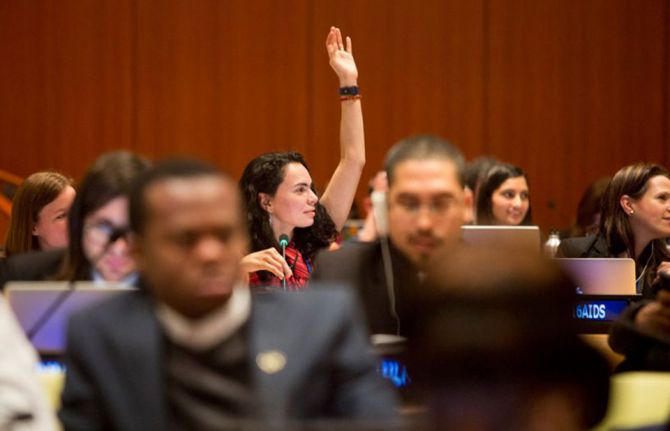
Feature Story
Representatives of people living with HIV, key populations and other affected communities selected to join the multistakeholder task force for the high-level meeting on HIV
29 March 2021
29 March 2021 29 March 2021Following a public call for nominations, UNAIDS and the Programme Coordinating Board nongovernmental organization delegation has selected 16 representatives of civil society and the private sector from all regions to join the multistakeholder task force for the high-level meeting on HIV.
More than 560 nominations were received and the task force has been established with a broad and diverse expertise. There are at least two members per region. More than 50% of the members are women and 25% are under the age of 30 years. Six are openly living with HIV and all key populations are represented.
The United Nations General Assembly will hold its first high-level meeting on HIV since 2016 on 8–10 June 2021. In the run-up to the meeting, before the end of April 2021, an interactive multistakeholder hearing will be held with the participation of communities and other stakeholders, who will also participate in other activities before and during the high-level meeting itself. The task force will advise UNAIDS on the format, theme and programme of the multistakeholder hearing and will help to identify speakers for the hearing and high-level meeting plenary and panel discussions.
Multistakeholder task force members
Andrew Spieldenner, US PLHIV Caucus and MPact Global Action, United States of America
Souhaila Bensaid, MENA-ROSA, Tunisia
Aaron Sunday, African Network of Adolescents and Young Persons Development and Association of Positive Youth Living with HIV in Nigeria, Nigeria
Adilet Alimkulov, Kyrgyz Indigo, Kyrgyzstan
Jacqueline Rocha Cortes, MNCP National Movement of WLWA, Brazil
Phelister Abdalla, Key Affected Populations Health and Legal Rights Alliance, Kenya
Aleksey Lakhov, Humanitarian Action and Coalition Outreach, Russian Federation
Judy Chang, International Network of People who Use Drugs, Italy
Sonal Mehta, International Planned Parenthood Federation, India
Yasmina Chan Lopez, Red Juvenil de AMUGEN, Guatemala
Alia Amimi, International Treatment Preparedness Coalition–MENA, Morocco
Jacques Lloyd, Afrique Rehabilitation and Research Consultants NPC, South Africa
Severin Sindizera, Indigenous Peoples Global Forum for Sustainable Development, Burundi
Angela Lee Loy, Aegis Business Solutions, Trinidad and Tobago
Jules Kim, Programme Coordinating Board nongovernmental organization delegation and Scarlet Alliance, Australia
Gideon B. Byamugisha, International Network of Religious Leaders Living with and/or Personally Affected by HIV, Uganda
Our work
Related


Feature Story
Call for nominations of people living with HIV, key populations and other affected communities to join the multistakeholder task force for the high-level meeting on HIV
10 March 2021
10 March 2021 10 March 2021The United Nations General Assembly will hold its first high-level meeting on HIV since 2016 on 8–10 June 2021.
In the run-up to the meeting, before the end of April 2021, an interactive multistakeholder hearing will be held with the participation of communities and other stakeholders, who will also participate in other activities before and during the high-level meeting itself.
To ensure the involvement of civil society and ensure an open, transparent and participatory process, UNAIDS is forming, by the end of March, a multistakeholder task force comprised of representatives of civil society and the private sector. The task force will advise UNAIDS on the format, theme and programme of the multistakeholder hearing and will help to identify speakers for the hearing and high-level meeting plenary and panel discussions.
Different constituency networks are asked to use their own networks and selection processes to nominate people to be considered for the task force. UNAIDS and the Programme Coordinating Board nongovernmental organization delegation will select individuals for each of the categories of members:
- One representative openly living with HIV of networks of people living with HIV.
- One representative openly living with HIV of networks of women living with HIV.
- One representative openly living with HIV of networks of young people.
- One representative of each of the key populations (people who use drugs, sex workers, transgender people, gay men and other men who have sex with men, people in prison settings).
- One member of the UNAIDS Programme Coordinating Board nongovernmental organization delegation.
- A representative of a women’s organization, particularly working on sexual and reproductive health and rights.
- A representative of a young’s people organization, particularly working on sexual and reproductive health and rights.
- A representative of the private sector.
- A representative of a faith-based organization.
- A representative of networks or organizations of indigenous people.
- A representative of networks or organizations of people with disabilities.
- A representative of an organization working with tuberculosis and HIV.
“The engagement of people living with HIV, key populations and other priority communities is fundamental for the success of the high-level meeting. Communities have led the way in the HIV response since the beginning and know what is needed to make sure that all people everywhere have what they need to prevent new HIV infections and to ensure that people living with HIV can survive and thrive. The task force represents an important platform for participation in the preparatory phase for the meeting. As the task force is necessarily limited in size, we are particularly interested in nominations of people from networks, who are closely linked across their communities and across regions, to be able to bring a deep and broad perspective. Additional opportunities for people living with HIV, key populations and other affected groups to engage with be made available throughout the lead-up to the high-level meeting,” said Laurel Sprague, UNAIDS Chief/Special Advisor, Community Engagement.
Civil society networks and relevant stakeholders are asked to submit nominations here by 16 March 2021 at 18.00 CET. The call for nominations with detailed information can be accessed here.
Learn more
Submit nominations by 16 March 2021
Related

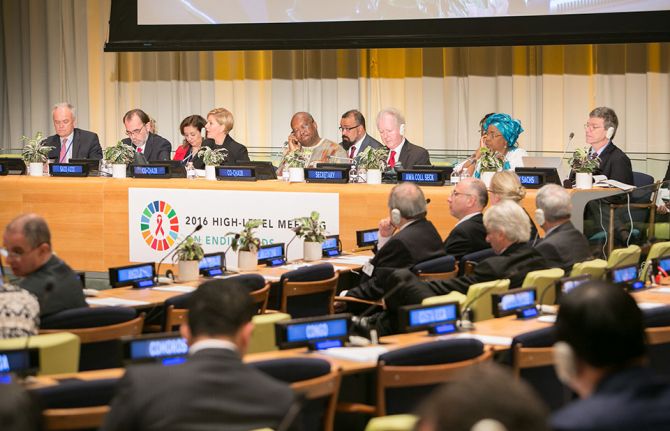
Press Statement
UNAIDS welcomes the United Nations General Assembly decision to hold a high-level meeting on HIV and AIDS in 2021
25 February 2021 25 February 2021GENEVA, 25 February 2021—UNAIDS welcomes the United Nations General Assembly decision for a high-level meeting on HIV and AIDS to take place from 8 to 10 June 2021. The high-level meeting will review the progress made in reducing the impact of HIV since the last United Nations General Assembly high-level meeting on HIV and AIDS in 2016 and the General Assembly expects to adopt a new political declaration to guide the future direction of the response. The high-level meeting will take place as the world marks 40 years since the first case of AIDS was reported and 25 years of UNAIDS.
“World leaders must seize the opportunity offered by this new United Nations General Assembly high-level meeting on HIV and AIDS to maintain their focus and commitment on ending AIDS as a public health threat as part of the 2030 Agenda for Sustainable Development,” said Winnie Byanyima, UNAIDS Executive Director. “The AIDS epidemic is unfinished business and must be ended for everyone everywhere, including for young women and adolescent girls and for other groups of people disproportionately affected by HIV. The right to health belongs to all of us.”
Progress towards ending the AIDS epidemic as a public health threat by 2030 as part of the Sustainable Development Goals has been highly uneven and the global goals for 2020 adopted in the 2016 United Nations Political Declaration on Ending AIDS were not met. Stigma and discrimination, the marginalization and criminalization of entire communities and a lack of access to health, education and other essential services continue to fuel the epidemic. Women and girls in sub-Saharan Africa and key populations (gay men and other men who have sex with men, sex workers, transgender people, people who inject drugs and people in prison) and their partners globally continue to be disproportionately affected by the HIV epidemic.
UNAIDS is currently developing a new global AIDS strategy for 2021–2026 through a process that is inclusive of all stakeholders in the AIDS response. The final draft strategy will be considered for adoption by the UNAIDS Programme Coordinating Board in March 2021. The new global AIDS strategy will include new targets to ensure that no one is left behind in ending AIDS, wherever they live and whoever they are. By achieving these targets, the number of people newly infected with HIV would fall to 370 000 by 2025, and the number of people dying from AIDS-related illnesses would be reduced to 250 000 in 2025.
Even the gains already made against HIV are threatened by the disruptions caused by the COVID-19 pandemic. The high-level meeting creates an opportunity to ensure that the world bolsters the resiliency of the HIV response to date, commits to rapid recovery post-COVID-19 and applies the lessons learned from the colliding epidemics of HIV and COVID-19 to create more resilient societies and health systems that are ready to meet future health challenges.
“The AIDS response has taught us that global solidarity is critical to making sustained progress against the impact of health threats like COVID-19,” said Ms Byanyima. “There must be concerted international efforts to reduce inequalities between countries and within them to strengthen the world’s capacity to absorb and defeat future global health challenges that put lives and livelihoods at risk everywhere.”
UNAIDS expresses its appreciation for the hard work of the high-level meeting co-facilitators, the permanent missions to the United Nations of Australia and Namibia, in the adoption of the resolution as well as to the President of the General Assembly for leading the process.
Given the constraints imposed by measures taken to contain the COVID-19 pandemic, it has not yet been decided if the high-level meeting will be in-person, virtual or a hybrid of the two. In line with the resolution, UNAIDS encourages the highest level of participation of United Nations Member States and the inclusion of civil society organizations and people living with or at risk of HIV in delegations to the high-level meeting. UNAIDS also looks forward to the multistakeholder hearing as a key opportunity to hear the voices of people living with, at risk of and affected by HIV, including key populations.
UNAIDS
The Joint United Nations Programme on HIV/AIDS (UNAIDS) leads and inspires the world to achieve its shared vision of zero new HIV infections, zero discrimination and zero AIDS-related deaths. UNAIDS unites the efforts of 11 UN organizations—UNHCR, UNICEF, WFP, UNDP, UNFPA, UNODC, UN Women, ILO, UNESCO, WHO and the World Bank—and works closely with global and national partners towards ending the AIDS epidemic by 2030 as part of the Sustainable Development Goals. Learn more at unaids.org and connect with us on Facebook, Twitter, Instagram and YouTube.

